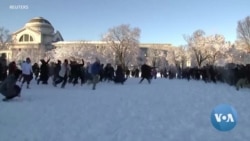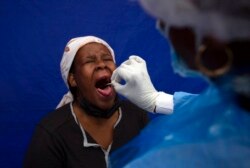U.S. President Joe Biden warned Tuesday there's "going to be a continued rise in cases" and that the "coming weeks are going to be challenging" because of the highly contagious omicron variant of the virus that causes COVID-19.
The comments came after the president met with his COVID-19 response team Tuesday. Biden encouraged Americans to "take advantage of what we already have" and said, "There's no excuse for anyone being unvaccinated."
Biden also addressed the current shortage of tests that is frustrating many Americans and promised to make booster shots and testing more widely available.
"We're making improvements," he said. He added that he's ordered the government to double its order of Pfizer COVID-19 pills, from 10 million to 20 million treatment courses.
The United States is dealing with its worst-yet surge in coronavirus cases, with more than 1 million cases reported in 24 hours, Bloomberg reported on Tuesday.
The omicron variant was first reported by South African scientists. On Tuesday, Dr. Salim Abdool Karim, a top South African doctor who until recently led that nation's COVID-19 task force, told VOA that this variant moves quickly.
"It's quite striking. It's almost twice as fast as what we saw with delta," he told VOA. "So, the cases rose rapidly. I describe it sometimes as almost like the north face of Mount Everest — it just climbed up, it rose at an extremely rapid rate. But it peaked quickly. And now we are close to the end of the second wave, or within a matter of just about six weeks. So, it goes up fast. And it comes down fast."
And, he said, in a nation with relatively low vaccination rates — about 30% of South Africans are vaccinated, compared with the worldwide average of about 49% — it has been less severe.
Dr. William Schaffner, an infectious disease professor at Vanderbilt University School of Medicine, said that could make this wave easier for health care systems to ride.
"We can't do very much about inhibiting the spread of this extraordinarily contagious virus," he said. "And if it only produces mild disease, we could, quote, 'tolerate' that while we try to continue to prevent these hospitalizations."
The U.S. has donated more than 315 million vaccine doses globally while pledging a total of 1.2 billion doses. Yet some health experts say wealthy nations are not doing enough to vaccinate the world and prevent the emergence of new variants.
"Until we redouble our commitment to vaccinate the African continent and Southeast Asia and Latin America, we're always going to have this problem, and that's what has to be prioritized," said Dr. Peter Hotez, dean of the National School of Tropical Medicine at Baylor College of Medicine. "And so far, neither the U.S. government or the G-7 countries have really made that commitment."
Karim agreed, and noted that while South Africa's general vaccination rate is low, the elderly population there boasts a 70% vaccination rate. In addition to urging wealthy nations to provide more vaccines, he urged countries with low vaccination rates to prioritize the most vulnerable.
"My advice would be to countries: Make sure that your health care workers and the elderly are fully vaccinated," he said. "And even if your overall coverage is not high, that will make a big difference to the number of severe cases of disease you are likely to see."
Karim has previously criticized the U.S. and other wealthy nations for imposing a travel ban on southern Africa after South African scientists reported the new variant. VOA asked him if the scientific community regrets sounding the alarm.
"I have no regrets," he said. "And I don't think anyone in South Africa has any regrets about our fundamental belief that we should be transparent, and that we should share information with everyone who might benefit from it in order to prevent the spread of this virus. So, I believe we did the right thing, and I believe we would do it again."
VOA's Anita Powell contributed to this report.








